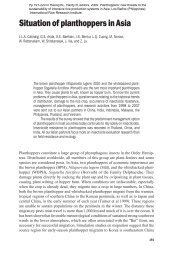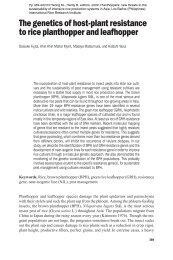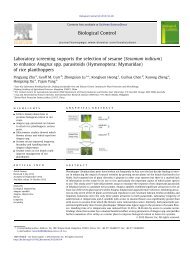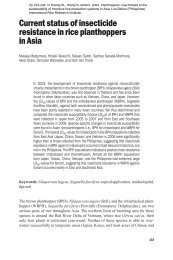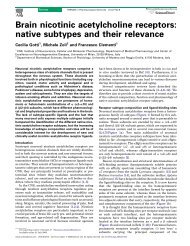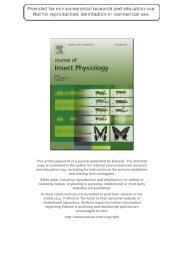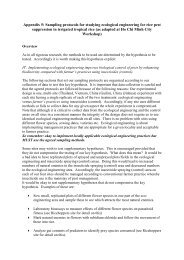Report-Training on rice arthropod biodiversity and ... - Ricehoppers
Report-Training on rice arthropod biodiversity and ... - Ricehoppers
Report-Training on rice arthropod biodiversity and ... - Ricehoppers
You also want an ePaper? Increase the reach of your titles
YUMPU automatically turns print PDFs into web optimized ePapers that Google loves.
Technical <str<strong>on</strong>g>Report</str<strong>on</strong>g><br />
FOURTH TAXONOMY SHUTTLE COURSE ON RICE<br />
ARTHROPOD BIODIVERSITY (Thail<strong>and</strong>: September 12-16, 2011)<br />
Dr. Alberto T. Barri<strong>on</strong> (C<strong>on</strong>sultant Entomologist-Tax<strong>on</strong>omist), Miss Josie Lynn A. Catindig<br />
(Assistant Scientist, CESD) <strong>and</strong> Miss Sylvia S. Villareal (Research Assistant, CESD)<br />
EXECUTIVE SUMMARY<br />
The fourth tax<strong>on</strong>omy shuttle training course <strong>on</strong> <strong>arthropod</strong> <strong>biodiversity</strong> c<strong>on</strong>ducted for<br />
ecological engineering research staff <strong>and</strong> enthusiasts was held in Pathumthani Rice Research<br />
Institute, Pathumthani Province, Thail<strong>and</strong> <strong>on</strong> September 12-16, 2011. Twenty-six participants –<br />
24 from the <strong>rice</strong> research center <strong>and</strong> 2 from the <strong>rice</strong> seed center representing a mixture of<br />
agr<strong>on</strong>omists, entomologists <strong>and</strong> plant pathologists joined the training course. The trainees were<br />
taught h<strong>and</strong>s-<strong>on</strong> techniques <strong>on</strong> <strong>arthropod</strong> processing for preservati<strong>on</strong> <strong>and</strong> identificati<strong>on</strong> based <strong>on</strong><br />
the <strong>rice</strong> fauna from Thail<strong>and</strong> that represented 6,487 specimens bel<strong>on</strong>ging to 11 orders (10 insects<br />
<strong>and</strong> 1 spider) c<strong>on</strong>stituting 97 families (86 insects <strong>and</strong> 11 spiders). Overall the training course was<br />
successful with a knowledge gain ranging from 6-60% based <strong>on</strong> pre-<strong>and</strong> post evaluati<strong>on</strong>.<br />
Ecological engineering- <strong>on</strong>e of the leading projects of the Internati<strong>on</strong>al Rice Research<br />
Institute (IRRI), Philippines is gaining momentum am<strong>on</strong>g the <strong>rice</strong> growing tracts that<br />
currently re- experienced the “tsunami-like invasi<strong>on</strong> of the Green Revoluti<strong>on</strong> pest”<br />
known as the <strong>rice</strong> brown planthopper, Nilaparvata lugens (Stal) <strong>and</strong> its relatives,<br />
Sogatella spp. <strong>and</strong> Laodelphax striatellus (Fallen) in South <strong>and</strong> Southeast Asia<br />
particularly in China, Malaysia, Thail<strong>and</strong> <strong>and</strong> Vietnam. Myanmar <strong>and</strong> the Philippines are<br />
also sharing similar interest in c<strong>on</strong>ducting the project. It aims to restore floral <strong>and</strong> faunal<br />
diversity in- <strong>and</strong> around <strong>rice</strong> fields—two important comp<strong>on</strong>ents in the <strong>rice</strong> habitat lost if<br />
not endangered by unnecessary use of chemical pesticides. The latter comp<strong>on</strong>ent is the<br />
key factor needed to promote the ecological functi<strong>on</strong>s or natural c<strong>on</strong>trol by predators <strong>and</strong><br />
parasitoids in regulating pest populati<strong>on</strong>s. Adopti<strong>on</strong> of ecological engineering <strong>on</strong> a wide<br />
scale will restore <strong>and</strong> c<strong>on</strong>serve <strong>arthropod</strong> <strong>biodiversity</strong> in the <strong>rice</strong> agroecosystems.<br />
Underpinning the research project, however, is the lack of “cadre of tax<strong>on</strong>omists” who<br />
can identify the diversity of predators, parasites <strong>and</strong> parasitoid species present in a given<br />
<strong>rice</strong> ecosystem. It is imperative to run basic <strong>arthropod</strong> identificati<strong>on</strong> training shuttle<br />
courses because of its paramount importance in ecological research endeavors, if <strong>on</strong>e is to<br />
underst<strong>and</strong> the intricate comp<strong>on</strong>ents <strong>and</strong> interacti<strong>on</strong>s, which are vital in developing better<br />
pest management tools <strong>and</strong> strategies. In realizati<strong>on</strong> to cope, three series of tax<strong>on</strong>omy<br />
shuttle courses had been c<strong>on</strong>ducted at CESD, IRRI (1 st , March 1-12, 2010); Hainan<br />
Isl<strong>and</strong>, China (2 nd , August 9-13, 2010) <strong>and</strong> Myanmar (3 rd , July 11-22, 2011). A cadre of<br />
56 trainees had been trained in <strong>arthropod</strong> (insects <strong>and</strong> spiders) tax<strong>on</strong>omy.



